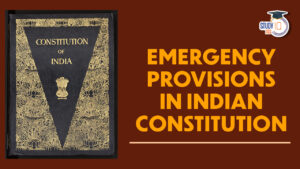Table of Contents
The Government of Tamil Nadu recently hosted the 16th Finance Commission, which was chaired by Arvind Panagariya. The Commission is strategically positioned to tackle India’s pressing fiscal challenges and address the imbalance in the financial relationship between the Union and the States.
Recommendations for the 16th Finance Commission
The Government of India has set up the 16th Finance Commission under Article 280(1) of the Constitution, with Dr. Arvind Panagariya as the Chairman.
- The previous guiding principles of the 15th FC, including enhancements in property tax collection and other fiscal strategies, need revisiting and updating.
- The 16th FC is encouraged to double the IGTs to urban areas to better align with the dynamic urbanisation of India.
- According to a McKinsey Global Institute report, without substantial investments, urban infrastructure deficits will exacerbate, leading to severe urban issues like water scarcity and untreated sewage problems.
Read this article below to know all about the Finance Commission of India in detail.
Finance Commission of India
The Finance Commission of India has been mentioned under Part XII, Chapter I (Finance) in Articles 280 and 281 of the Indian Constitution. The Finance Commission is a quasi-judicial body which recommends the Indian President in matters related to financial distribution between union and state government by demarcating the set of formulas and mechanisms as needed to the situation in the country and Constitution.
Facts about Finance Commission
| Facts about Finance Commission | |
| Body | It is a constitutional, independent, non-political body. |
| Composition | It consists of a chairman and four other members. |
| First Constituted | The First Finance Commission was constituted on April 6, 1952 |
| Part of Constitution | XII of Constitution |
| Constitutional Mandate | Article 280(1) of the Constitution mandates the establishment of the Finance Commission every fifth year or sooner.
|
| Appointed by | The President Of India |
| Qualification | As prescribed by the Parliament. |
| Chairman | Must have experience in public affairs. |
| Other Members (4) |
|
| Purpose | To ensure fair and equitable distribution of tax revenue between the central government (Union) and individual states. |
| Tenure of Finance Commission | 5 years |
Composition of Finance Commission of India
The Finance Commission of India has five members, including one Chairman and four others, all appointed by the President of India. The Parliament determines their qualifications and appointment process.
- The Chairman must have expertise in public affairs; currently, Mr. Arvind Panagariya holds this position. The four members can be a high court judge, a finance expert, someone with diverse financial and administrative experience, or a person with special knowledge in economics.
- The 15th Finance Commission consists of Mr. N.K. Singh as Chairman, with members Mr. Ajay Narayan Jha, Prof. Anoop Singh, Mr. Ashok Lahiri, and Prof. Ramesh Chand, along with Mr. Arvind Mehta as Secretary.
Qualification of Finance Commission Members
The Parliament has been empowered by the Indian Constitution in order to determine the qualification and manner required through which the member of the Finance Commission is selected. The Chairman should be a person with good experience in the field of public affairs and the other four members need to be from the following:
- High Court Judge or qualified to be the HC Judge
- Need to have specialized Knowledge of Accounts and Finance of the Indian Government.
- Vastly experienced in the field of administration and finance
- Specialised knowledge in the field of economics
Functions of Finance Commission
The Finance Commission of India has specific functions set by the President. Its main job is to make recommendations to the President, which include:
- Tax Distribution: The Commission recommends how to share tax revenues between the Union and states, as well as among states.
- Grants-in-Aid: It suggests how grants-in-aid should be given to states and Union Territories from the Consolidated Fund of India.
- Support for Local Bodies: The Commission advises on ways to increase state funds to support local governments and panchayats, based on state finance commission recommendations.
- Reporting: After fulfilling its duties, the Commission submits a report to the President, who then presents it to Parliament with an explanation of the Commission’s actions.
Interestingly, until 1960, the Finance Commission also advised certain states to share export duty revenues from jute products for a temporary period of up to 10 years.
List of Finance Commission Chairman
In India since 1951 till date, a total of fifteen Finance Commissions have been constituted. The List of Finance Commissions Chairman has been mentioned in the table below:
|
Finance Commission Chairman List |
||
| Finance Commissions | Chairman name | Establishment Year |
| 1st Finance Commission | K.C. Neogy | 1951 |
| 2nd Finance Commission | K. Santhanam | 1956 |
| 3rd Finance Commission | A.K. Chanda | 1960 |
| 4th Finance Commission | Dr. P.V. Rajamannar | 1964 |
| 5th Finance Commission | Mahavir Tyagi | 1968 |
| 6th Finance Commission | Brahamananda Reddy | 1972 |
| 7th Finance Commission | J.M. Shelat | 1977 |
| 8th Finance Commission | Y.B. Chavan | 1982 |
| 9th Finance Commission | N.K.P. Salve | 1987 |
| 10th Finance Commission | K.C. Pant | 1992 |
| 11th Finance Commission | A.M. Khusro | 1998 |
| 12th Finance Commission | Dr. C. Rangarajan | 2002 |
| 13th Finance Commission | Dr. Vijay Kelkar | 2007 |
| 14th Finance Commission | Y.V. Reddy | 2013 |
| 15th Finance Commission | N.K Singh | 2017 |
| 16th Finance Commission | Mr. Arvind Panagariya | 2023 |
Previous Shortfalls
- Ineffective Redistribution: Horizontal devolution mechanisms often failed to drive real growth in underdeveloped States despite allocating higher resources.
- Decline in Effective Devolution: The Fifteenth Finance Commission recommended a 41% vertical share for States, but actual devolution was only 33.16% due to increasing cess and surcharges by the Union government.
- Inconsistent Fiscal Autonomy: Centrally Sponsored Schemes (CSS) imposed higher financial burdens on States without sufficient autonomy to tailor programs to local needs.
- Overreliance on Static Metrics: Distribution formulas often relied on backwardness indices, overlooking evolving needs like urbanisation, demographic transitions, and economic performance.
- Limited Incentives for Performers: High-performing States like Tamil Nadu often felt penalized for their success, receiving fewer resources relative to their contributions to national GDP.
Current Challenges Faced by States
- Demographic Shifts: States with aging populations face declining tax revenues and increasing welfare costs.
- Urbanisation Pressure: Rapid urbanisation in States like Tamil Nadu has led to higher demands for infrastructure and urban planning resources.
- Middle-Income Trap: Progressive States risk stagnating economically before achieving sustained high-income status, especially without adequate fiscal support.
- Climate Resilience: Extreme weather events and environmental challenges necessitate significant investment in mitigation and adaptation strategies.
- Balancing Redistribution with Growth: Striking a balance between aiding underdeveloped States and incentivizing high-performing States remains contentious.
Future Outlook
- Enhanced Fiscal Autonomy: Increasing States’ share in the divisible pool to 50% and allowing greater flexibility in spending CSS funds can empower States to address local priorities effectively.
- Performance-Linked Allocation: Evolving a balanced approach where high-performing States receive adequate incentives alongside equitable redistribution to underdeveloped States.
- Focus on Urbanisation: Allocating targeted funds for urban infrastructure in rapidly urbanizing States to ensure sustainable development.
- Climate and Demographic Planning: Developing frameworks to support aging populations and address climate vulnerabilities through dedicated grants and incentives.
- Data-Driven Decision-Making: Incorporating dynamic metrics such as real-time economic performance, migration trends, and environmental changes in resource allocation formulas.
- Aligning with Global Opportunities: Leveraging trends like “friendshoring” and “reshoring” to position States as global manufacturing and investment hubs.


 India Mediation Campaign, Objectives, Pr...
India Mediation Campaign, Objectives, Pr...
 Emergency Provisions in Indian Constitut...
Emergency Provisions in Indian Constitut...
 Directive Principles of State Policy (DP...
Directive Principles of State Policy (DP...





















